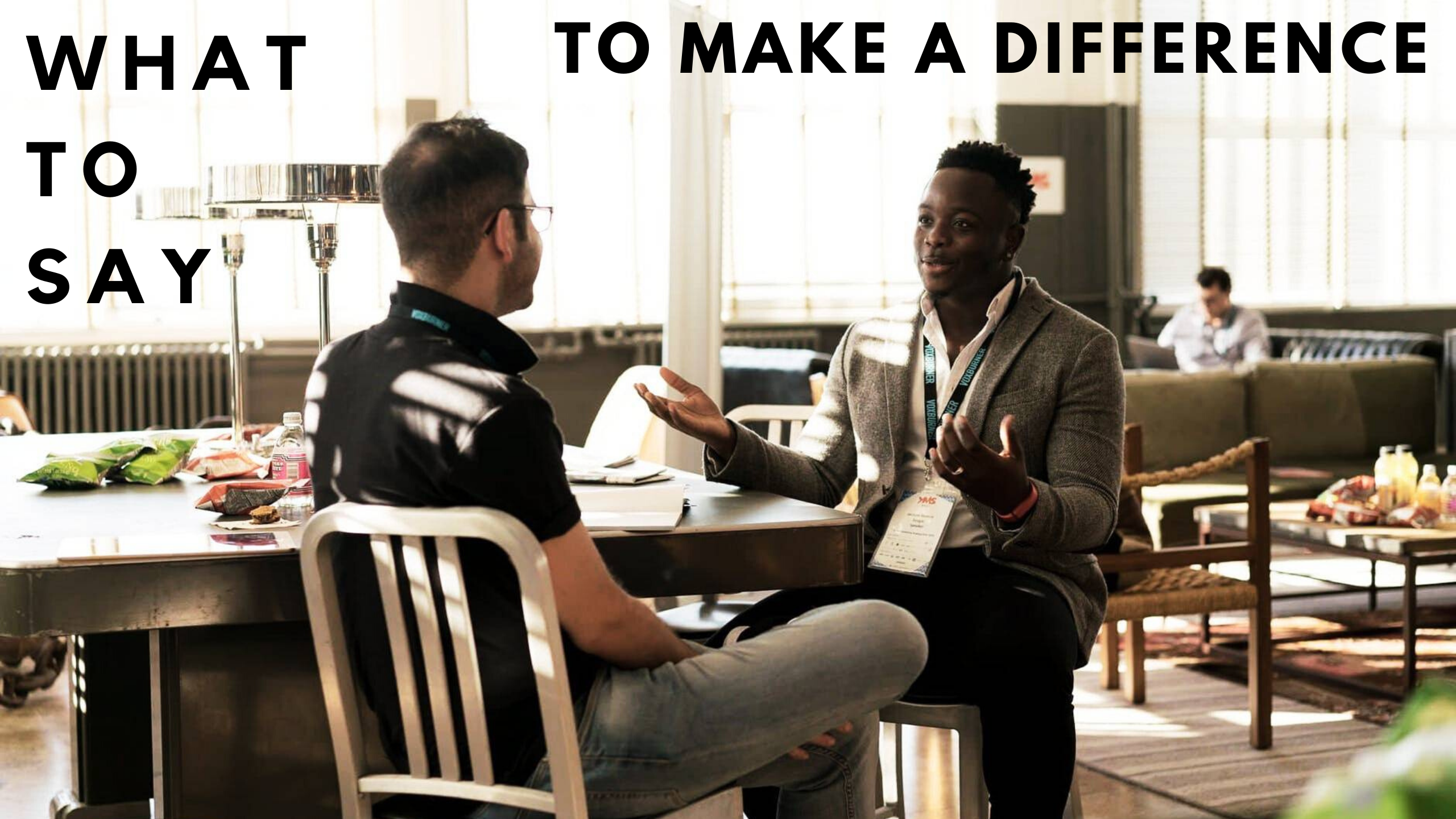What To Say To Make A Difference
There is not doubt that the power of deep communication strengthens the connection between two people. Really being heard can not only validate the speaker but can heal the hurting and build lasting relationships.
Beginning the process of learning how to engage in this type of listening started last week with a post entitled "Deep Listening Heals The Heart – 7 Tips To Get Started".
It gave tips like putting yourself in someone else's shoes, avoiding the urge to compare their situation to yours, picking the right time to support the conversation, and following up to show that you care.
This week we look at what you can say to make a difference when it's your time to speak. Being an empathetic listener may require you to support the conversation with your words of encouragement.
When that time comes, here are 8 tips to make the most of your opportunity.

1
Be Silent At First
Be silent, you say. I thought this post was about what to say when it's your time to talk.
It is, but, one of the first acts to giving the best response is to be silent first.
Silence the voice in your head that wants to spit out an impulsive, "gut" response that may not be the best thing to say.
First, silence that impulsive thinking by turning your thoughts to empathizing ones instead. Think of the words you can say to show that you really do understand.
It might sound obvious and trite, but one of the biggest obstacles to listening is resisting the urge to voice impulsive thoughts.
Many people falsely express empathy by recalling their own similar experiences at the expense of turning the conversation around to themselves.
Put aside your own needs, and wait patiently for the other person to unfold their thoughts at their own pace and in their own way before you say a word.

2
Reassure The Person Of Your Confidentiality
There was a time when someone who opens up to you with some meaningful conversation was expecting you to keep their conversation private. Today, people feel the need to share anything to the public without your permission.
Therefore, conversations may not go as deeply as needed if there is some uncertainty that your privacy will not be respected.
So, before the conversation goes to far, make it clear that your conversation will be kept private. Let them know that you are trustworthy and know how to keep your mouth shut.
Here's what to say. Tell them that whatever is said between you two will not be repeated, and let them know they can trust you. Your word is your bond.
When you say that, you should really mean it. That bond should never be broken unless there is some life threatening reason, like the threat of suicide.
If you can't actually keep this bond, and can't be trusted to keep the confidentiality, then you'll never be a good listener.

3
Be Encouraging When You Do Speak
To keep the conversation moving in a fluid fashion that supports what is being talked about, you will be required to speak at certain times.
When you do, keep thoughts of support and empathy in the forefront as you interject.
It's helpful to summarize and restate key points that you're hearing, and offer encouragement along the way.
Here's how you can do it:
- Repeat and encourage: Repeat some things the speaker said and, at the same time, provide positive feedback as encouragement. For example, you might say, "I can see why you're struggling right now, because that is a hard situation to tackle. I can see your determination to persevere."
- Summarize and restate: To demonstrate that you have been intently listening, it is extremely useful to summarize your understanding of what has been said. Restate it in your own words. This reassures the speaker that you have truly been listening to what he or she is saying. It also provides the speaker with an opportunity to correct mistaken assumptions and misconceptions you may have picked up along the way.
- Keep an open mind. Make sure to leave the door wide open by usings statements like, "I may be wrong, but..." or "...Correct me if I am wrong."
This technique is especially useful when you find yourself getting frustrated or you sense that your listening focus is wavering.

4
Ask Meaningful And Empowering Questions
When a person is working their way through a difficult situation, their initial conversation may only be a way to emotionally deal with what they are going through.
Listening to what they are saying may not make perfect sense at all. Talking may just be a way to release some emotions.
Be patient. Don't integrate them with a barrage of questions, but asking a few here and there can help the person move from a state of emotion to a state of logical thinking.
Aim to use questions as a means by which the speaker can begin to reach his or her own conclusions about the issues being discussed.
Here are some things to keep in mind:
To avoid asking questions that are too probing, approach your questioning from the standpoint that you're the one confused and need them to clarify to help you better understand.
A good question to ask is "Can you help me understand .... better?"
That approach takes them off the defensive, and makes them feel as though they are actually assisting you to better understanding of their situation.
If you use this questioning process sparingly and strategically, the speaker should begin to move from a more emotional response to a more logical and constructive one.

5
Wait For The Person To Open Up
For deep listening, patiently waiting until it's the right time to talk may be the hardest work of all.
An active listener must be ever-so-patient and let the speaker go through his or her full flow of thoughts, feelings and ideas before you interject.
The conversation may, at first, start as a trickle and gradually unfold. Conversely, it could be an avalanche of words that won't stop for a long time.
If you press too early and ask too many personal, probing questions, that may actually make the person feel defensive and reluctant to share any more information.
To keep your patience, keep imagining yourself in their shoes, and try to completely understand why they are having this conversation.

6
Do Not Interrupt With What You Feel Or Think
Try your best not to interrupt the speaker while they are expressing their feeling about the important matter.
If you interrupt the person too soon, then he or she will be frustrated and won't fully absorb what you're saying.
The person talking will be eager to finish saying his or her part and you'll be causing a nuisance and a distraction.
Instead wait for the other person to ask your opinion before breaking the flow of their discourse.
When you do get your opportunity to chime in, try to abstain from giving direct advice (unless you're asked for it).
Instead, let the individual talk the situation out and find his or her own way. This empowers both the individual and you.
This course of action will most likely result in beneficial change in the circumstance, and a better understanding for you both.

7
Reassure The Speaker
Whenever you reach the conclusion of the conversation, reassure the speaker that you were happy that they chose you to share with.
Assure them that you are happy to be their sounding board whenever they want to continue the conversation.
Let them know that you'll make contact with them to see how they are doing, but don't want to put any pressure on them.
If the situation is really bad, don't say, "It's all going to be okay". Instead you can say that you're there to listen and to help anytime they need you.
This, in and of itself, is an extremely valuable way to help.

8
When Asked To Give Advice
Think about what is best for the person in question rather than what you have done in the past. Remember, everyone experiences things differently.
If you are asked to give advice, stick to the facts at hand, and limit giving your opinion. You can reframe your advice with the "I" qualifier.
Your advice may have worked for you, but may not work for someone else.
Whenever you do give some advice, express it in a soft, non-threatening way, and listen to the response to gauge how it's being received.

Conclusion
The power to change this world is to share our human experiences through meaningful conversations empowered by deep listening.
With an open mind and an empathetic heart we can connect in a very profound way.
This way involves the type of listening that can take you out of yourself and place you in the shoes of another. It can broaden your perspective to things you may not be able to see.
For the hurt and suffering, deep listening can be the medicine that promotes transformative healing.
Equip yourself with this valuable tool, and use it on someone different from yourself.
Question
"When have you had a deep conversation with someone different from you? What did you learn?"
Please tell me about your experience in the comments below.
Get Articles First.
Sign Up For Our Mailing List Today!

Thank You

"Thanks for reading.
Hope it helps you in some way.
Please post a comment below, and let me know what you think.
Share it with the Super Achievers you know, and join our mailing list for more helpful tips.
The information you share with someone could be the difference between success and failure in their life.
And remember,
"Make something great happen today."


